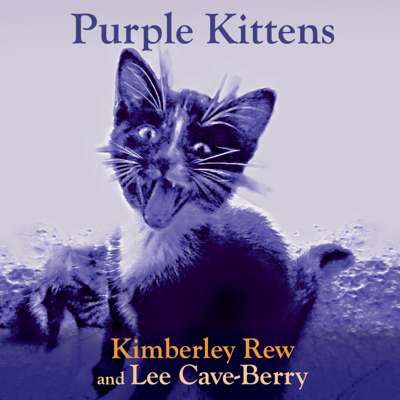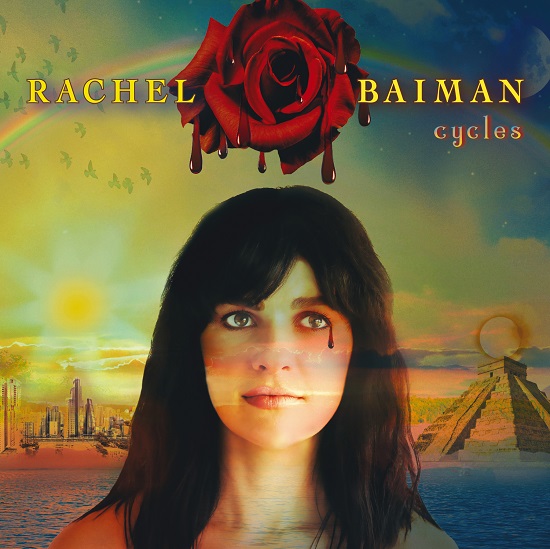
My first proper exposure to the work of Kimberley Rew was when I reviewed the retrospective, “Sunshine Walkers”, in 2020. There’s a theme running through that collection and “Purple Kittens” as well; a celebration of Englishness. Not the populist, flag-waving, “Vindaloo”-singing Englishness. Not that at all. It’s real ale at a riverside pub with the sounds of a skittle alley and maybe a Morris side performing. That kind of Englishness; the kind that’s celebrated by songwriters like Roy Harper and Ray Davies. So it’s appropriate that the album’s opener is “Penny the Ragman”.
The song’s a tribute to Kimberley’s late cousin, Penny, who, among other things, looked after the uniforms for a Morris side (a position known as Ragman) and was inspired by conversations at her wake. It’s a pretty good companion piece for The Kinks’ “The Village Green Preservation Society” as a celebration of a vanishing lifestyle. However, there’s a lot more to “Purple Kittens” than nostalgia; both Kimberley Rew (guitars and vocals) and partner Lee Cave-Berry (bass and vocals) are natural songwriters in the Nick Lowe mould, creating great songs out of eternal themes or the most mundane events and situations, even out of one repeated phrase.
Which is exactly what “Raspberry Ripple Ice Cream” does. Against a spiky, punky riff, the only lyrics are the title (apart from a slight culinary diversion into rum and raisin) sung by both Kimberley and Lee, and a bass solo. It’s just a bit of fun, but it’s done really well. “Black Ribbon” is more serious; it’s a rocking tribute to Roger Smith, of the Cambridge band Jack, who died of COVID last year. It was written by his two grandsons (aged six and eight) the ribbon of the title isn’t a mourning accessory, it refers to the band he wore round his Panama hat.
The Soft Boys cover, “Kingdom of Love”, is progressive and psychedelic with Kimberley/Lee harmonies in the chorus that evoke Nancy Sinatra and Lee Hazlewood, while Lee’s “Unsatisfactory Cats” is a whimsical Kirsty MacColl-tinted exploration of cat behaviour that cat owners/servants will identify with – I certainly did. “Wrong Song” uses the musician’s lot as a metaphor for our daily lives; live performance is a one-off thing and any mistakes are part of your history. You only get one try and you can’t fix it or remix it. There’s also a reference running through the song to Paul Simon’s “50 Ways to Leave your Lover”. Finally, “Daytime Night Time”, which closes the album, runs through the mundane cycle of life, from birth to death, in under five minutes (and that includes extended guitar riffing referencing Chuck Berry and Francis Rossi). It’s a joyous celebration of life and rock ‘n’ roll music.
“Purple Kittens” won’t be troubling the national album charts, but that won’t keep Kimberley Rew and Lee Cave-Berry awake at night. They make albums and play live for the sheer joy of it; that’s what they do and that in itself is worth celebrating. “Purple Kittens” is twelve songs celebrating lives, ways of life and sometimes just cats and ice cream, created and crafted with skill and joy, and a real love for this country. I’ll take that, thank you very much.
“Purple Kittens” is out now on KL Recording (KKL016).
Here’s the video for “Wrong Song”:

It’s been a long time coming; after over twenty years of making music, Afton Wolfe has finally released a solo album. It’s worth waiting for. “Kings for Sale” is an album created by an artist with an intimate knowledge of the underside of the music business; its compromises, its failures and its occasional successes. This is an album of flawless songs (originals and interpretations) delivered in a rasping baritone over a wide variety of musical settings. The scope of the arrangements, the raw vocal and the subjects of the songs make the Tom Waits comparisons inevitable, but you can hear many other influences there, including a nod towards Greg Dulli’s solo soundscapes on “Cemetery Blues”.
There’s a lot happening instrumentally on “Kings for Sale”, although it’s more about atmosphere and ambience rather than a constant presence from the start to the finish of a song. Afton also uses speech samples and sound effects to create the perfect sonic settings, whether it’s spoken word intros or water flowing through a song. Everything’s there for a reason and nothing’s wasted. And this is probably the moment to get this out of the way; the unusual soundscapes and subject matter, and the rough-hewn baritone voice have more than a hint of Tom Waits. There, I’ve said it.
The album swings into action with a full band and horns on “Paper Piano”, a story of growing up poor and using imagination and creativity to deal with the poverty. It’s a great groove to catch the attention from the letter A and even has a Van Morrison-esque piano breakdown before the big finale. At the other end of the album is a song at the other end of the scale. “O’ Magnolia” is delivered in the style of a hymn by a church choir and is an exhortation to the state of Mississippi to change its flag to remove the old Confederate imagery and replace it with something more representative of the 21st century, namely the state flower, the magnolia*.
Between the opener and the closer, there’s a treasure trove of musical styles and lyrical themes from the slow country fiddle and pedal steel of “Carpenter”, using biblical imagery to tell a story of misunderstandings in crowded, alcohol-soaked rooms to the doom-laden grunge of B.W. Goodwin Jr’s “Cemetery Blues”. The lyrics are minimal, but the sonic treatment creates an atmosphere of menace and foreboding; it’s difficult and beautiful. A personal favourite, following on from “Cemetery Blues” is M.J. West’s “Mrs Ernst’s Piano”, a story of the tentative first steps on a journey to racial equality that’s still far from complete.
Nine songs and nothing resembling a damp squib; Afton Wolfe’s own songs and the carefully chosen interpretations combine to create a lovely blend of styles and lyrical themes. And there are a few thought-provoking references. The word ’cover’ appears twice, a reference to the compromises a musical innovator has to make to survive financially, while the opening line of the album, ‘Every good boy does a little bit better’ references the mnemonic used by educators to teach the notes on the treble stave. That’s the level of detail that you can pick out from these songs.
“Kings for Sale” is out now on Grandiflora Records. Here’s the video for “Dirty Girl”, a road trip down through Mississippi to New Orleans:
*The new Mississippi flag was officially adopted on January 11, and it looks like this:


It’s all worthwhile when you hear an album as good as this. Rachel Baiman has created a collection of ten songs with a range of Americana musical stylings that is intensely personal while also referencing current social and political issues in the USA (although the album was recorded in Australia). The other thing you’ll notice about the songs is that whether personal or political, they mainly address issues that directly affect women (Rachel herself, her sister, her sister-in-law and her grandmother). They aren’t all happy stories, but that’s the whole point; the various cycles of life have good and bad phases. The mid-tempo title song, with its distinctive layered vocal is a tragic and yet uplifting story of two generations of women from the same extended family binding together in mutual support to deal with a still-birth and then a difficult birth; it’s deeply moving.
The two overtly political songs sit side by side on the album. “Rust Belt Fields” is Rachel’s take on a Rod Picott/Slaid Cleaves song; the song’s ten years old, but still sounds relevant. The minimalist one-bar percussion loop creates the relentless feel of the automobile production line, lost forever to more cost-effective (exploitative) overseas territories. The song is a fatalistic acceptance of the corrosion of the Steel Belt to the Rust Belt and the unmourned loss of the jobs this entailed: ‘No-one remembers your name just for working hard’. “Wyoming Wildflowers” is a Rachel Baiman/Olivia Hally song that uses the theme of diverse colours in nature to skewer white supremacist views. The lyrics are set against a gentle country-rock arrangement and the message is emphasized by the repetition of the final two lines.
There are ten superb examples of the songwriter’s art on “Cycles” including another that pressed all of my buttons, “No Good Time for Dying”, which deals with watching someone you love suffer the indignities of a protracted death; it’s not pretty, but it’s the end of the cycle that starts with the opening song. The album’s final song, “The Distance”, tackles the way we habitually deal with recurring life situations in the same way because it’s easier than thinking about another way.
The Rachel Baiman/Olivia Hally musical arrangements and production on “Cycles” are deceptively simple while featuring ambient instrumental sounds and layers of vocals that always allow the songs plenty of room to breathe. There are hints at times of the vocal stylings of Neil Young, Emmylou Harris, and even Rickie Lee Jones (on “No Good Time for Dying”) but the bottom line is very much Rachel Baiman, teasing out themes of family, work versus relationships, politics and even the “I Will Survive” sentiment of “Hope it Hurts”. This album is complex, sometimes painful and very rewarding.
“Cycles” is released in the UK on Signature Sounds Recordings (SIG-CD-2129 / SIG-LP-7038) on Friday June 11th. Here’s the video to “Joke’s On Me”:


